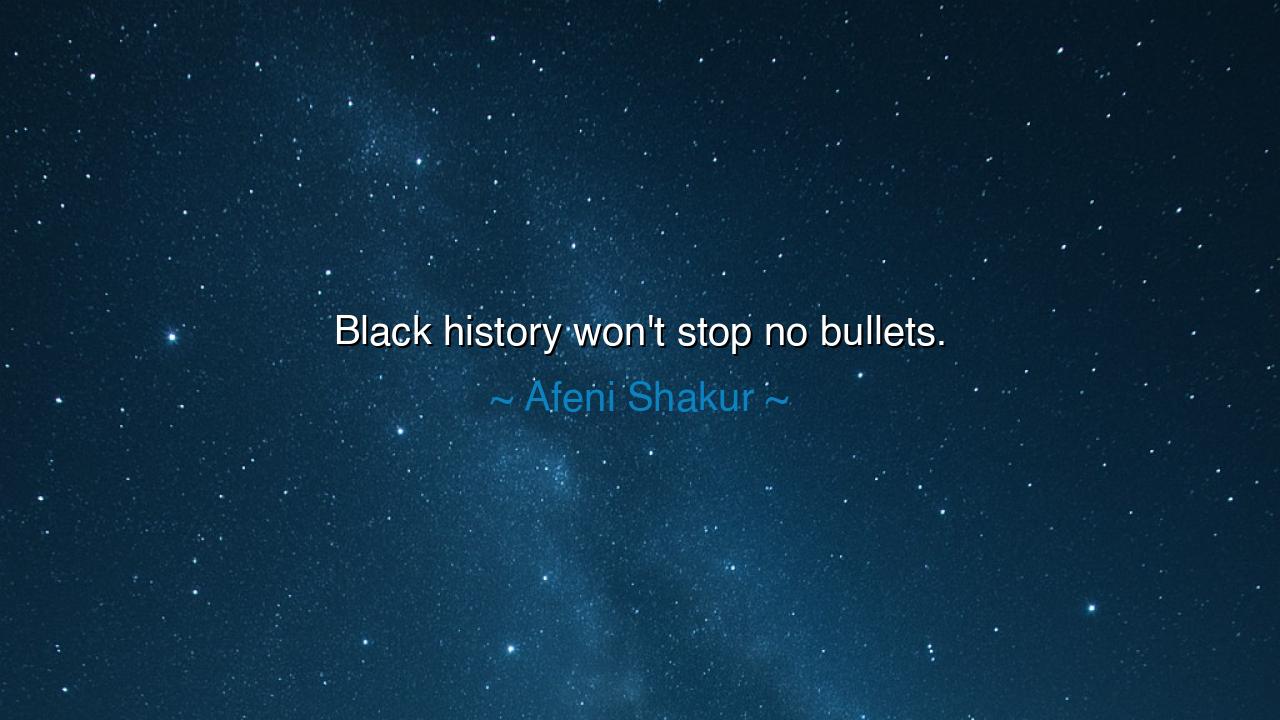
Black history won't stop no bullets.






Afeni Shakur, mother, activist, and fierce spirit of the struggle, once spoke words that burn with both sorrow and defiance: “Black history won’t stop no bullets.” In this single sentence, she unveiled a truth both painful and profound — that knowledge without action, pride without protection, remembrance without resistance, are not enough to shield a people from the violence of the world. Her voice was not one of despair, but of challenge. For in those few words, she called upon her generation — and all who would come after — to turn memory into movement, and wisdom into will.
The meaning of her words is rooted in the harsh soil of reality. History, however sacred, is not armor; it cannot stop the hand that pulls the trigger, nor silence the system that gives it power. To know the past is vital, but to act in the present is survival. Afeni, a revolutionary of the Black Panther Party, understood this with her whole being. She had studied the heroes — Harriet Tubman, Frederick Douglass, Malcolm X — but she also knew that their spirit demanded more than admiration. It demanded continuation. In saying “Black history won’t stop no bullets,” she was warning her people not to rest in remembrance, but to rise in readiness — for justice must be lived, not merely learned.
The origin of this quote lies in the crucible of the civil rights movement and the Black Power era of the 1960s and 70s. Afeni Shakur, born Alice Faye Williams, lived in a time when oppression was not hidden in subtle laws or distant policies — it walked the streets in the uniforms of police, in the language of fear, and in the chains of poverty. As a Panther, she witnessed firsthand how knowledge of one’s history could inspire strength, but also how it could be rendered powerless if not joined with action, unity, and self-defense. Her words echo the truth learned in the fire of activism: awareness alone does not bring liberation; it must be joined with courage, strategy, and sacrifice.
History itself bears witness to the balance she demanded. Consider Dr. Martin Luther King Jr., who wielded the knowledge of justice, philosophy, and theology with divine eloquence. Yet, for all his wisdom, his marches were met with batons and bullets. Knowledge gave him purpose, but it was the collective movement of bodies, the physical presence of thousands standing together, that forced the conscience of a nation to awaken. Or think of Malcolm X, who preached that education is the passport to the future — yet he also warned that “you can’t teach freedom to a man who’s under attack unless you also teach him to defend himself.” These two pillars of the struggle, though different in method, both knew what Afeni would later declare outright: that ideas must walk with action, and that survival demands both spirit and strategy.
Afeni’s words also carry a deeper layer of grief — the kind that mothers know too well. She spoke as one who had watched her people’s bodies fall, generation after generation, beneath the weight of injustice. Later, she would lose her own son, Tupac Shakur, to the same violence she had warned against. The bullets that took his life were not stopped by his fame, nor his genius, nor even his deep love of his heritage. Her warning thus became prophecy — that no celebration of history, however powerful, can halt the destruction of lives unless the world itself is transformed. She knew that the past is sacred, but the present is urgent.
Yet, Afeni did not speak these words to extinguish hope. She spoke them to ignite it — to remind her people that knowing who they are is the beginning, not the end. To honor the ancestors means not only to study their struggle, but to continue it with fire in the heart and clarity in the mind. “Black history won’t stop no bullets” is not a denial of history’s power, but a call to embody it — to turn remembrance into revolution, education into empowerment, knowledge into protection.
The lesson, then, is clear and eternal: awareness without action is a half-born freedom. To know your history is to awaken; to live its truth is to fight for justice. Do not mistake pride for preparation, or heritage for safety. Learn, yes — but also organize, vote, build, defend, and uplift. Let your knowledge be the weapon and your compassion the shield. Afeni’s words remind us that the world will not change through remembrance alone; it will change when those who remember decide to rise.
So remember her teaching, children of the struggle: do not rest in history — live it, move it, and make it anew. Let the stories of your ancestors guide your hands, not just your hearts. The bullets of this world are not only metal; they are ignorance, inequality, and silence. History cannot stop them — but unity can. Love can. Action can. For the truest way to honor those who came before is to ensure that those who come after will not have to fight the same battles again.






AAdministratorAdministrator
Welcome, honored guests. Please leave a comment, we will respond soon